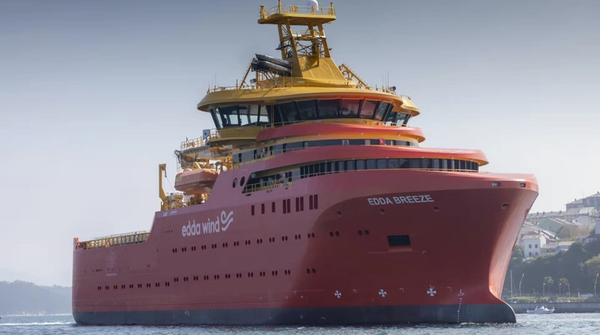
Norwegian offshore wind services firm Edda Wind has taken delivery of its first CSOV, the Edda Breeze. The vessel was built by Astilleros Gondán shipyard in Spain.
The hydrogen-ready vessel is the first to be delivered as part of a nine-vessel newbuilding program.
The new Commissioning Operation Vessel (CSOV) will in August go on a ten-year contract with Ocean Breeze at the Bard Offshore 1 wind farm in Germany.
“The delivery of Edda Breeze marks the start of deliveries for our newbuilding program of nine vessels. More importantly, we have already secured long-term contracts for the first four newbuilds. Hence, each vessel delivery means increased revenues and improved profitability for Edda Wind,” says Kenneth Walland, CEO of Edda Wind.
“Edda Breeze is the first CSOVs in the world prepared with a hydrogen-based energy system planned for four weeks endurance. In principle, this means that this vessel in a few years’ time is capable of supporting the construction and commissioning of wind farms without generating carbon emissions,” adds Kenneth Walland. E
Edda Breeze is of Salt 0217 design and build number C489 from Astilleros Gondán shipyard in Spain, the same yard that delivered Edda Passat and Edda Mistral in 2018.
The vessel is 88.3 meters long with a beam of 19.7 meters. It can accommodate up to 120 persons onboard.
In addition to Edda Breeze and the eight vessels part of the newbuild program – six CSOVs and two Service Operations Vessels (SOVs) – currently on order, Edda Wind owns and operates two SOVs, Edda Passat and Edda Mistral.
The two latter vessels are both on charters for Ørsted on wind farms offshore the UK. Also, Edda Wind operates one chartered-in frontrunner vessel, the Edda Fjord. Edda Fjord started the Ocean Breeze contract in April 2021 and will operate until replaced by Edda Breeze.
“Operators are continuously looking for ways to improve the efficiency of wind farm operations and reduce operating costs and environmental footprint. Our specially designed offshore wind service vessels provide exactly this. We expect demand for specialised service vessels to improve, and we are well-positioned to capitalize on this trend,” adds Kenneth Walland.